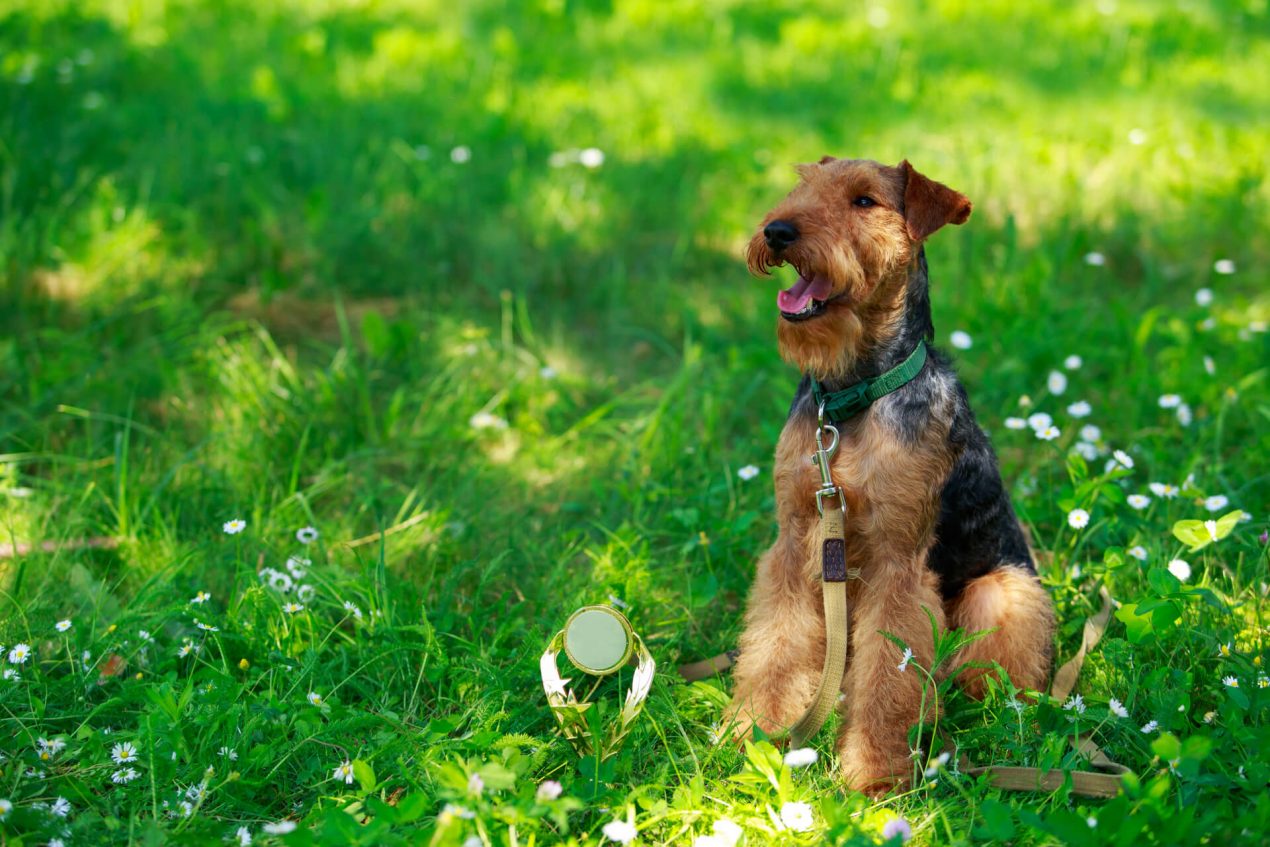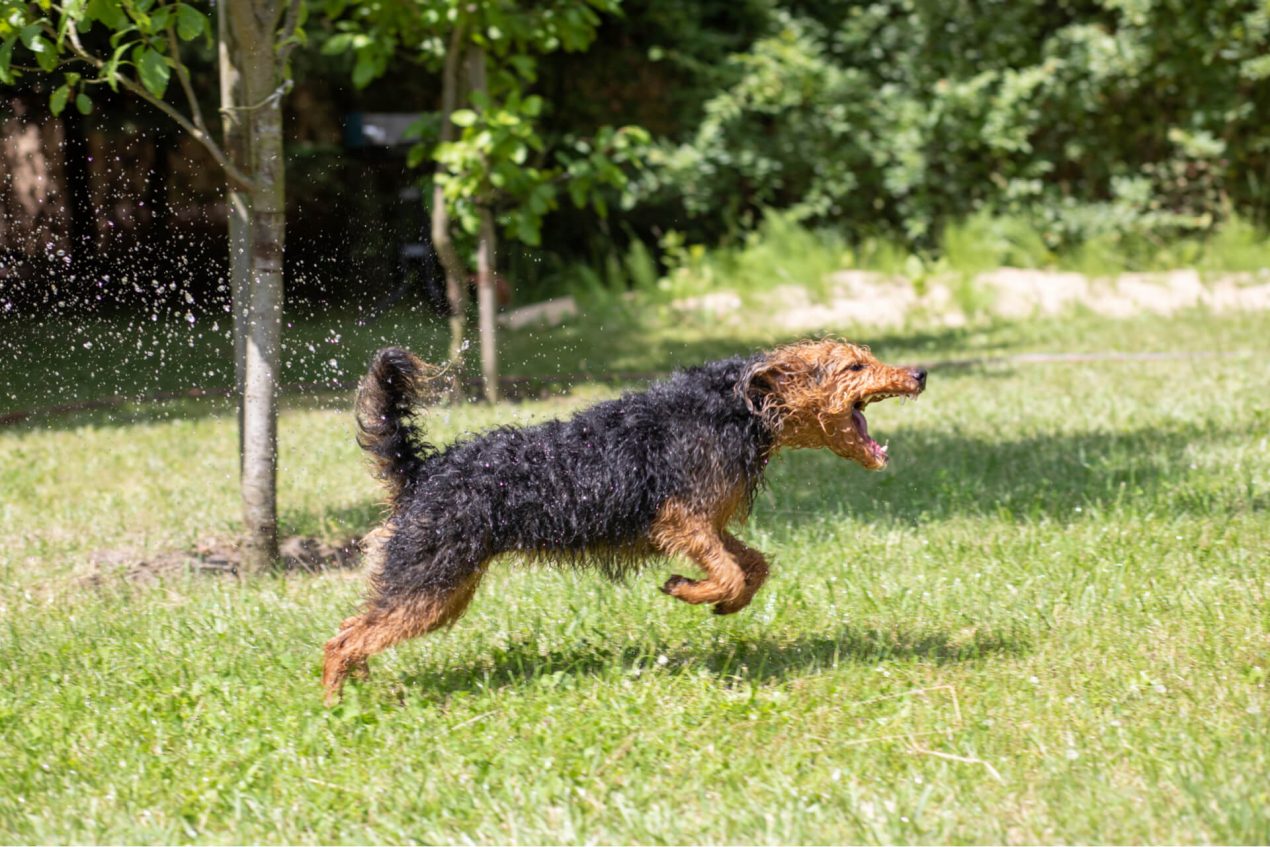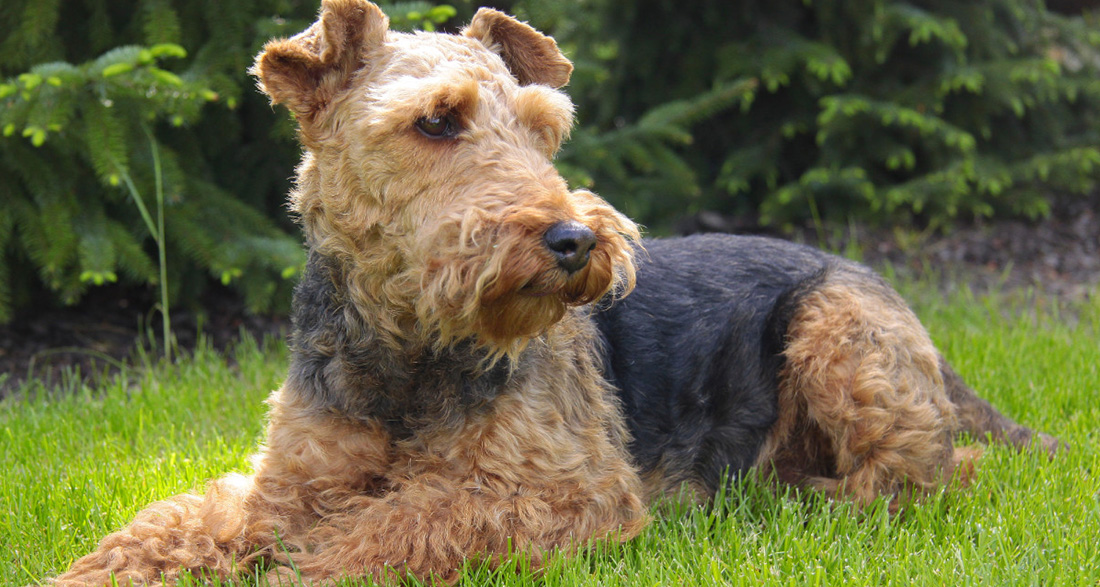Welsh Terriers are considered ideal family dogs. However, you must not underestimate these little daredevils. They are extremely intelligent and lively. With the necessary stimulation and consistent training, they become the ideal companion for the whole family.
History of the Welsh Terrier
Welsh Terriers are the oldest terrier breed worldwide. Black and Tan Terriers were already known in the 10th century. The name Welsh Terrier or Carnarvonshire Welsh Terrier was first mentioned in a document from 1737. For centuries, these small terriers accompanied their people on hunts for foxes, badgers, and other small game.
Their task was to drive the animals out of their burrows without injuring them. Like all terriers, they worked underground; “terrier” is derived from the Latin word “terra” for earth. However, they were not only used for hunting. As farm dogs, they guarded the property of farmers and kept the stables free of rats, mice, and other unwanted guests.
In the seclusion of Wales, there was no mixing with other dogs, so the Welsh Terrier maintained its appearance and character over time. However, it also did not become known beyond the borders of Wales. Its striking resemblance to the Airedale Terrier, both in appearance and character, is deceiving. The two breeds are not closely related.
Nevertheless, the Welsh Terrier is often referred to as a small Airedale Terrier. The first Welsh Terrier breed club was founded in 1886, breed standards were established, and targeted breeding began. The breed was recognized by the international organization FCI (Fédération Cynologique Internationale) in 1954.
Breed Overview
GROUP: Terrier
HEIGHT: 15 inches
WEIGHT: 20 to 22 pounds
COAT: Dense, hard, and wiry outer coat with a soft undercoat
COAT COLOR: Tan and black
LIFE SPAN: 12 to 15 years
TEMPERAMENT: Independent, energetic, friendly, alert, confident, courageous
HYPOALLERGENIC: Yes
ORIGIN: Wales
Nature and Character
A Welsh Terrier scores with a wide range of positive traits. Welsh Terriers are lively, cheerful, and playful. Therefore, they bring the best conditions to become a real buddy for the whole family. They are particularly affectionate towards children and appreciate playing and romping with them. They are affectionate and easily trainable with good upbringing. These intelligent dogs are alert and quick learners. They enjoy being the center of attention. Watchful and brave, they look after their home and their people.
Compared to other terriers, they are not very quarrelsome, but when it comes to defending territory or people, they will stand up to larger dogs. Despite their alertness, they are not barkers. They are generally relaxed and not aggressive in encounters with other dogs. Their hunting instinct is strong, so you should only let your Welsh Terrier off the leash if you are sure he cannot escape, such as at the dog park or in the garden.
Even well-trained descendants of hunting dogs can forget all obedience when faced with a corresponding stimulus of instincts. It is also typical for terriers that Welsh Terriers can be capricious and stubborn. Yet, despite their moods, a Welsh Terrier is a real treasure that enriches family life with its open, lively nature.
| Affection Level | Medium |
| Friendliness | Medium |
| Kid-Friendly | Medium |
| Pet-Friendly | Medium |
| Exercise Needs | High |
| Playfulness | High |
| Energy Level | High |
| Trainability | Medium |
| Intelligence | High |
| Tendency to Bark | High |
| Amount of Shedding | Low |
Acquiring a Welsh Terrier
Before you welcome a Welsh Terrier as a new family member, you should be aware that he is not a dog that simply walks alongside you. He needs to be stimulated, both physically and mentally. You must bring enough time for your four-legged friend and be willing to be active yourself. A simple walk is not enough for the spirited Welsh Terrier.
You should always buy a Welsh Terrier puppy from a reputable breeder. However, it is always worth asking at local animal shelters or terrier rescue organizations and “Terrier in Need.” Unfortunately, papers and pedigrees do not protect against ending up in animal welfare. The blame is rarely on the animals, and a dog from animal welfare does not automatically mean that there are problems with him. Often dogs end up in shelters because the loving owner became ill or has to go to a nursing home. Other animals are victims of divorce.

What should I pay attention to when buying?
If you want to buy your Welsh Terrier puppy from a breeder, then the AKC and the Welsh Terrier Club of America are a good address to find a trustworthy breeder.
Nevertheless, there are still some points to consider when you want to buy a puppy:
- The first impression counts
- What impression does the mother make?
- Does the breeder also ask you questions?
- Is it possible to visit multiple times?
A visit to the breeder should definitely be allowed. Look around carefully. How do the animals live? Are they integrated into the family? Does the mother make an alert, healthy impression? A reliable breeder will allow you to visit your puppy several times before purchase. You should also take advantage of this if the breeder does not live too far away. If a breeder also asks you questions, it is not eavesdropping, but a good sign. A reputable breeder cares about the welfare of his puppies and wants to know if they are going to good hands.
If you want a Welsh Terrier, you should expect a purchase price of $900 to $1,200. This may seem high at first glance, but you must consider that a breeder who cares about his dogs also has high food and veterinary costs. When a puppy from a reputable breeder moves in with you, it usually has already had the first veterinary visits and vaccinations. Under no circumstances should you respond to online offers that are far below this price. These dogs come from so-called breeders, they are often already sick as puppies, and they lack the necessary socialization.
Development and training of the puppy
Welsh Terriers are considered easy to train, and compared to other terriers, they are. The “will to please,” the desire to please his human, is pronounced in this affectionate dog, and he is ready to obey. Additionally, the intelligent dog learns quickly. However, you should not underestimate the training of the Terrier. From the beginning, you must be loving but consistent in training.
If you show leniency once, your clever dog will exploit it. He tends to want to take the lead, and you must stubbornly show him that you are the pack leader who dictates where to go. Especially if you have no experience in dog training, it is recommended to attend a puppy and dog school. There your rascal will also get to know other dogs and how to interact with them.

How to Care for a Welsh Terrier?
For the small Welsh Terrier, an apartment that doesn’t even have to be large is sufficient as a living space. The relaxed dog is even suitable for city life. However, especially under such conditions, it is important that you stimulate and be active with your four-legged friend. After a day where he was allowed to really exhaust himself and was mentally challenged, he enjoys a cuddle session with his human on the sofa.
Activities with the Welsh Terrier
The lively, affectionate Welsh Terrier is open to all activities as long as he can be with his human. He accompanies you hiking, jogging, and cycling just as happily as to dog sports. A Welsh Terrier is particularly suitable for:
- Agility
- Dog dancing
- Fetch games
- Disc dogging
- Flyball
- Obedience
Health and Grooming
Fortunately, the Welsh Terrier has never been a victim of overbreeding. Breed-specific diseases are therefore not known; he is a robust, less susceptible companion. You should regularly brush his wiry coat. A Welsh Terrier needs to be trimmed two to four times a year. He does not shed, making him suitable for allergy sufferers.
Interesting Facts
The Welsh Terrier had different names in different countries, which led to some confusion. For example, in the USA, it was long called the “Old English Terrier.” In its homeland, its breed standard was listed together with that of the Old English Wire Haired Black and Tan Terrier. This breed has since become extinct, and in the USA, the Welsh Terrier now bears its correct name.
Do you have a Welsh Terrier or are you planning to get one? Tell me in the comments what makes him so special in your opinion!


